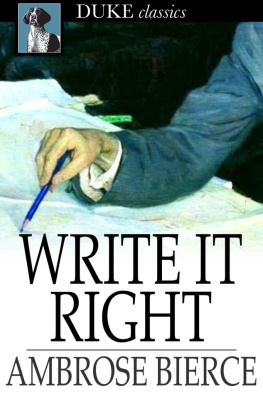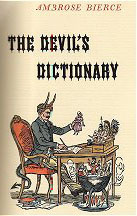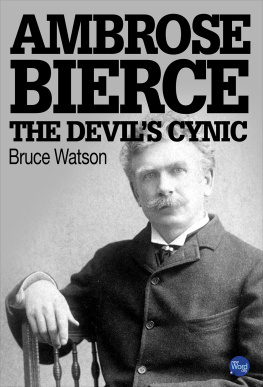Ambrose Bierce - Write It Right. A Little Blacklist of Literary Faults
Here you can read online Ambrose Bierce - Write It Right. A Little Blacklist of Literary Faults full text of the book (entire story) in english for free. Download pdf and epub, get meaning, cover and reviews about this ebook. genre: Children. Description of the work, (preface) as well as reviews are available. Best literature library LitArk.com created for fans of good reading and offers a wide selection of genres:
Romance novel
Science fiction
Adventure
Detective
Science
History
Home and family
Prose
Art
Politics
Computer
Non-fiction
Religion
Business
Children
Humor
Choose a favorite category and find really read worthwhile books. Enjoy immersion in the world of imagination, feel the emotions of the characters or learn something new for yourself, make an fascinating discovery.

- Book:Write It Right. A Little Blacklist of Literary Faults
- Author:
- Genre:
- Rating:4 / 5
- Favourites:Add to favourites
- Your mark:
- 80
- 1
- 2
- 3
- 4
- 5
Write It Right. A Little Blacklist of Literary Faults: summary, description and annotation
We offer to read an annotation, description, summary or preface (depends on what the author of the book "Write It Right. A Little Blacklist of Literary Faults" wrote himself). If you haven't found the necessary information about the book — write in the comments, we will try to find it.
Write It Right. A Little Blacklist of Literary Faults — read online for free the complete book (whole text) full work
Below is the text of the book, divided by pages. System saving the place of the last page read, allows you to conveniently read the book "Write It Right. A Little Blacklist of Literary Faults" online for free, without having to search again every time where you left off. Put a bookmark, and you can go to the page where you finished reading at any time.
Font size:
Interval:
Bookmark:
Aims and the Plan
The author's main purpose in this book is to teach precision in writing; and of good writing (which, essentially, is clear thinking made visible) precision is the point of capital concern. It is attained by choice of the word that accurately and adequately expresses what the writer has in mind, and by exclusion of that which either denotes or connotes something else. As Quintilian puts it, the writer should so write that his reader not only may, but must, understand.
Few words have more than one literal and serviceable meaning, however many metaphorical, derivative, related, or even unrelated, meanings lexicographers may think it worth while to gather from all sorts and conditions of men, with which to bloat their absurd and misleading dictionaries. This actual and serviceable meaning not always determined by derivation, and seldom by popular usage is the one affirmed, according to his light, by the author of this little manual of solecisms. Narrow etymons of the mere scholar and loose locutions of the ignorant are alike denied a standing.
The plan of the book is more illustrative than expository, the aim being to use the terms of etymology and syntax as little as is compatible with clarity, familiar example being more easily apprehended than technical precept. When both are employed the precept is commonly given after the example has prepared the student to apply it, not only to the matter in mind, but to similar matters not mentioned. Everything in quotation marks is to be understood as disapproved.
Not all locutions blacklisted herein are always to be reprobated as universal outlaws. Excepting in the case of capital offenders expressions ancestrally vulgar or irreclaimably degenerate absolute proscription is possible as to serious composition only; in other forms the writer must rely on his sense of values and the fitness of things. While it is true that some colloquialisms and, with less of license, even some slang, may be sparingly employed in light literature, for point, piquancy or any of the purposes of the skilled writer sensible to the necessity and charm of keeping at least one foot on the ground, to others the virtue of restraint may be commended as distinctly superior to the joy of indulgence.
Precision is much, but not all; some words and phrases are disallowed on the ground of taste. As there are neither standards nor arbiters of taste, the book can do little more than reflect that of its author, who is far indeed from professing impeccability. In neither taste nor precision is any man's practice a court of last appeal, for writers all, both great and small, are habitual sinners against the light; and their accuser is cheerfully aware that his own work will supply (as in making this book it has supplied) many "awful examples" his later work less abundantly, he hopes, than his earlier. He nevertheless believes that this does not disqualify him for showing by other instances than his own how not to write. The infallible teacher is still in the forest primeval, throwing seeds to the white blackbirds.
A. B.
The Blacklist
"A hotel." "A heroic man." Before an unaccented aspirate use an. The contrary usage in this country comes of too strongly stressing our aspirates.
Action for Act"In wrestling, a blow is a reprehensible action." A blow is not an action but an act. An action may consist of many acts.
Admission for Admittance"The price of admission is one dollar."
Admit for ConfessTo admit is to concede something affirmed. An unaccused offender cannot admit his guilt.
Adopt"He adopted a disguise." One may adopt a child, or an opinion, but a disguise is assumed.
Advisedly for Advertently, Intentionally"It was done advisedly" should mean that it was done after advice.
AffordIt is not well to say "the fact affords a reasonable presumption"; "the house afforded ample accommodation." The fact supplies a reasonable presumption. The house offered, or gave, ample accommodation.
AfraidDo not say, "I am afraid it will rain." Say, I fear that it will rain.
Afterwards for AfterwardAggravate for Irritate"He aggravated me by his insolence." To aggravate is to augment the disagreeableness of something already disagreeable, or the badness of something bad. But a person cannot be aggravated, even if disagreeable or bad. Women are singularly prone to misuse of this word.
All of"He gave all of his property." The words are contradictory: an entire thing cannot be of itself. Omit the preposition.
Alleged"The alleged murderer." One can allege a murder, but not a murderer; a crime, but not a criminal. A man that is merely suspected of crime would not, in any case, be an alleged criminal, for an allegation is a definite and positive statement. In their tiresome addiction to this use of alleged, the newspapers, though having mainly in mind the danger of libel suits, can urge in further justification the lack of any other single word that exactly expresses their meaning; but the fact that a mud-puddle supplies the shortest route is not a compelling reason for walking through it. One can go around.
Allow for Permit"I allow you to go." Precision is better attained by saying permit, for allow has other meanings.
Allude to for MentionWhat is alluded to is not mentioned, but referred to indirectly. Originally, the word implied a playful, or sportive, reference. That meaning is gone out of it.
And so, And yet"And so they were married." "And yet a woman." Omit the conjunction.
And which, And whoThese forms are incorrect unless the relative pronoun has been used previously in the sentence. "The colt, spirited and strong, and which was unbroken, escaped from the pasture." "John Smith, one of our leading merchants, and who fell from a window yesterday, died this morning." Omit the conjunction.
Antecedents for Personal HistoryAntecedents are predecessors.
Anticipate for Expect"I anticipate trouble." To anticipate is to act on an expectation in a way to promote or forestall the event expected.
Anxious for Eager"I was anxious to go." Anxious should not be followed by an infinitive. Anxiety is contemplative; eagerness, alert for action.
Appreciate for Highly ValueIn the sense of value, it means value justly, not highly. In another and preferable sense it means to increase in value.
Approach"The juror was approached"; that is, overtures were made to him with a view to bribing him. As there is no other single word for it, approach is made to serve, figuratively; and being graphic, it is not altogether objectionable.
Appropriated for Took"He appropriated his neighbor's horse to his own use." To appropriate is to set apart, as a sum of money, for a special purpose.
Approve of for ApproveThere is no sense in making approve an intransitive verb.
Apt for Likely"One is apt to be mistaken." Apt means facile, felicitous, ready, and the like; but even the dictionary-makers cannot persuade a person of discriminating taste to accept it as synonymous with likely.
Around for About"The debris of battle lay around them." "The huckster went around, crying his wares." Around carries the concept of circularity.
ArticleA good and useful word, but used without meaning by shopkeepers; as, "A good article of vinegar," for a good vinegar.
As for That, or If"I do not know as he is living." This error is not very common among those who can write at all, but one sometimes sees it in high place.
As as for So as"He is not as good as she." Say, not so good. In affirmative sentences the rule is different: He is as good as she.
As for for As to"As for me, I am well." Say, as to me.
Font size:
Interval:
Bookmark:
Similar books «Write It Right. A Little Blacklist of Literary Faults»
Look at similar books to Write It Right. A Little Blacklist of Literary Faults. We have selected literature similar in name and meaning in the hope of providing readers with more options to find new, interesting, not yet read works.
Discussion, reviews of the book Write It Right. A Little Blacklist of Literary Faults and just readers' own opinions. Leave your comments, write what you think about the work, its meaning or the main characters. Specify what exactly you liked and what you didn't like, and why you think so.








